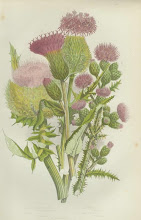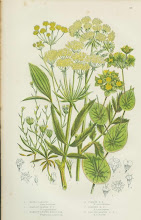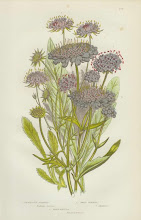 There's nothing quite so relaxing as a nice hot bath, accompanied by the gentle glow of light from a bathroom full of lit candles. In addition to bathing the body, baths can be ritually cleansing to prepare for the sacred circle, emotionally cleansing to free the mind of stress and troubles, and physically healing to free the body of toxins and negative conditions. Aromatic remedies are among the most ancient. Old herbal texts prescribed the calming scents of thyme and sage leaf to ease the terror of nightmares (known as "night ghosts") and bald men were told if they washed their heads with sage tea they could be assured that their hair would indeed grow back. While this last one may not be true, herbal bath remedies can cure much that ails us.
There's nothing quite so relaxing as a nice hot bath, accompanied by the gentle glow of light from a bathroom full of lit candles. In addition to bathing the body, baths can be ritually cleansing to prepare for the sacred circle, emotionally cleansing to free the mind of stress and troubles, and physically healing to free the body of toxins and negative conditions. Aromatic remedies are among the most ancient. Old herbal texts prescribed the calming scents of thyme and sage leaf to ease the terror of nightmares (known as "night ghosts") and bald men were told if they washed their heads with sage tea they could be assured that their hair would indeed grow back. While this last one may not be true, herbal bath remedies can cure much that ails us.Basic Bath Time Herbal Tea Bags
1/2 cup fresh grated ginger root
2 tablespoons of one or more of the following herbs (or use your own favorites):
lemon verbena (dried)
rosemary sprigs (fresh or dried)
peppermint or spearmint leaves (fresh or dried)
chamomile (dried)
lavender blossoms or sprigs (dried)
lemon balm (dried)
sweet marjoram (dried)
grated goldenseal root (dried)
plaintain leaves (dried)
rose petals (fresh)
You may use a small cheesecloth bag tied with a string, or make small folded rice paper packets (in the style of a store-bought tea bag), stitched closed. Combine the ginger root with the herbs of your choice and place in the sachet style of your choice. Run a very hot bath, add a few small bags, allow them to steep while the water cools a bit, then remove the bags and climb on in. Made as small tea bags with strings, these make wonderful gifts to give to someone who loves herbal baths (just be sure to label your ingredients so your recipient knows what's in them and let them know these aren't to be consumed internally).
If you haven't the time or motivation to make yourself bath time tea bags, a simple herbal bath will also work wonders and feel great. You can add sprigs of fresh rosemary to your bath for a pine-like fragrance. Actual pine needles can be used as well which are said to relieve nervous tension. Rosemary is not only invigorating, but will ease physical aches and pains and can rejuvenate a tired, sallow complexion. Ginger root will break a fever, induce sweating, improve your circulation and will also ease sore joints and tired feet.
Native Americans took sponge baths decocted with verbena leaves to combat nervousness and tension. Calendula, comfrey and chamomile used separately or together will also calm nerves and are an excellent choice as an astringent bath for oily or blemished skin. Chamomile is also an effective cure for soothing hemorrhoids.
Elder flowers steeped in hot water will make a gently cleansing and sweetly floral scented bath that will help induce sleep and relax the nerves, as will lemon balm, which in addition to being a sleep aid can also help to relieve cramps.
To soften the skin and counteract both hard water and some of the stronger herbs, add some milk to your bath (Cleopatra bathed regularly in camel's milk and she had men falling at her feet).
Please note that if this is the first time you'll be using any of these herbs, it is best to perform a 24 hour skin test beforehand for each plant. Take a small amount of the herb to be used, pulverize it and if it's in dried form add a few drops of water to moisten it. Dab the paste onto your forearm just inside your elbow, cover with a band-aid and let it sit untouched for 24 hours. If any redness, itching or swelling occurs, do not use that herb. As always, use common sense when working with herbs. Take nothing internally without being absolutely sure it's edible and safe and use nothing that you feel you may be allergic to.
Photo courtesy of floraleads.com













No comments:
Post a Comment